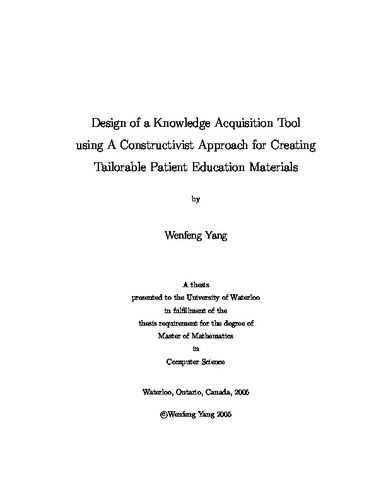| dc.contributor.author | Yang, Wenfeng | en |
| dc.date.accessioned | 2006-08-22 14:20:34 (GMT) | |
| dc.date.available | 2006-08-22 14:20:34 (GMT) | |
| dc.date.issued | 2005 | en |
| dc.date.submitted | 2005 | en |
| dc.identifier.uri | http://hdl.handle.net/10012/1194 | |
| dc.description.abstract | Research in patient education suggests that tailored educational materials can improve patient's understanding of a treatment plan and help to achieve patient engagement and compliance. The goal of the HealthDoc Project has been the creation of automated Natural Language Generation systems for producing educational materials that are tailored to an individual patient's medical condition and personal situation. The project has so far focused on developing computational linguistic tools needed to author tailorable content from which customized versions could be generated. Also the HealthDoc model of document generation assumes the existence of previously authored textual material. Therefore, a new approach is needed to construct these materials and ensure that the relevant medical knowledge will be captured and delivered to the patient by providing a means to assist the health care professionals in directly authoring the required domain knowledge. <br /><br />We have used constructivist educational theory and knowledge-level modelling to define a new approach incorporating Patient-centric and Behaviour-modifying Educational Model (PBEM) and a knowledge-acquisition framework. Unlike traditional approaches, in which all patients are treated alike in terms of the medical information provided, our new model takes into account characteristics of individual patients. This facilitates the patient's assimilation of relevant information pertaining to her behaviour and health. As the information provided must address the various concerns of different stakeholders, and different patients have different concerns and concern intensities, a knowledge-acquisition framework was developed to provide a structure for patient knowledge acquisition. This framework includes the following components: a Strategic Model, a Concerns Model, and an Interrogation-based knowledge-acquisition Tool. The tool is intended to be used directly by health care professionals and to assist them in formulating, structuring, representing, and articulating their domain knowledge. This research work explores a new field, knowledge-level modelling, for generating patient-tailored educational materials and provides guidelines to implementing such a knowledge-acquisition tool. | en |
| dc.format | application/pdf | en |
| dc.format.extent | 610847 bytes | |
| dc.format.mimetype | application/pdf | |
| dc.language.iso | en | en |
| dc.publisher | University of Waterloo | en |
| dc.rights | Copyright: 2005,
Yang, Wenfeng. All rights reserved. | en |
| dc.subject | Computer Science | en |
| dc.subject | Constructivism | en |
| dc.subject | tailored patient educational materials | en |
| dc.subject | patient education model | en |
| dc.subject | knowledge-level modelling | en |
| dc.subject | Interrogation | en |
| dc.subject | Strategic Model | en |
| dc.subject | Concerns Model | en |
| dc.subject | Concern Matrix | en |
| dc.title | Design of a Knowledge Acquisition Tool using A Constructivist Approach for Creating Tailorable Patient Education Materials | en |
| dc.type | Master Thesis | en |
| dc.pending | false | en |
| uws-etd.degree.department | School of Computer Science | en |
| uws-etd.degree | Master of Mathematics | en |
| uws.typeOfResource | Text | en |
| uws.peerReviewStatus | Unreviewed | en |
| uws.scholarLevel | Graduate | en |

